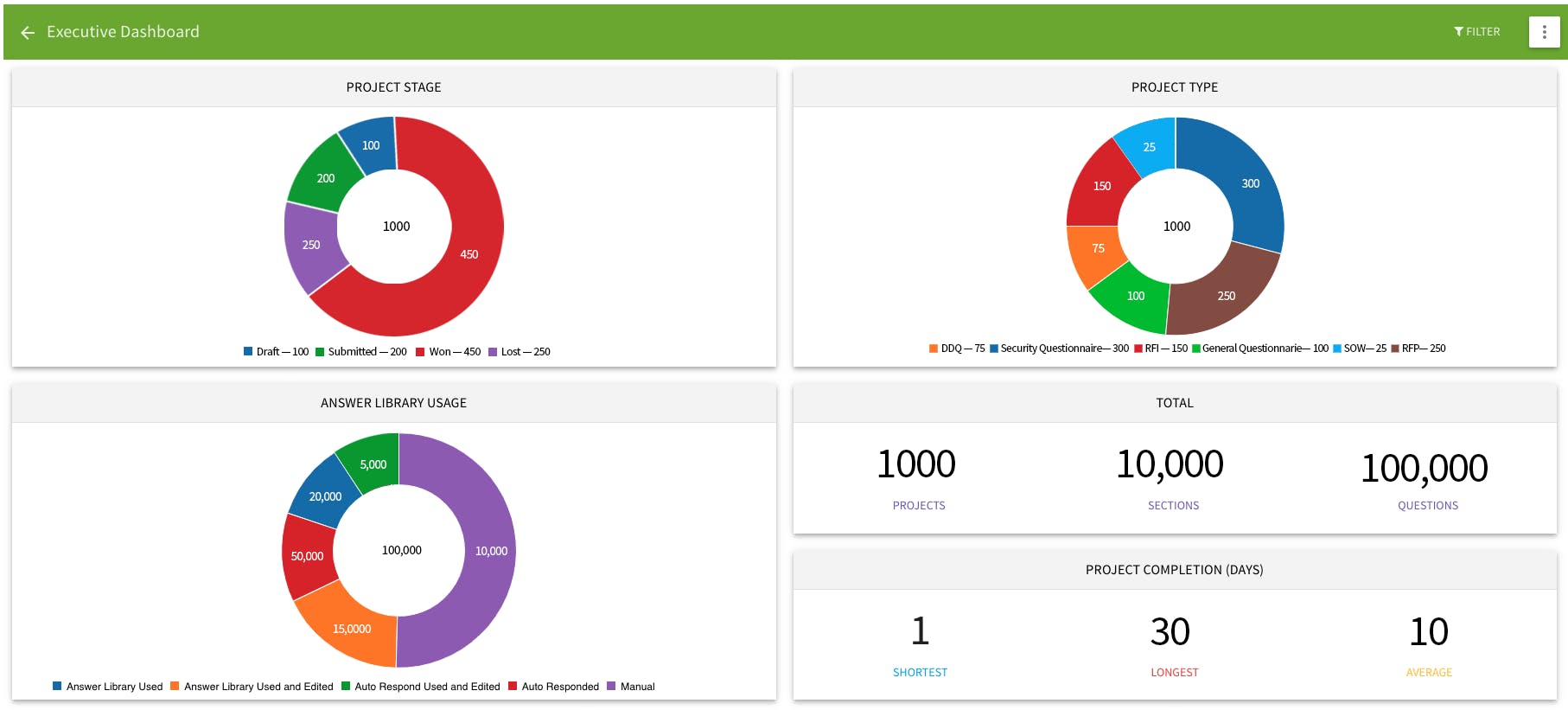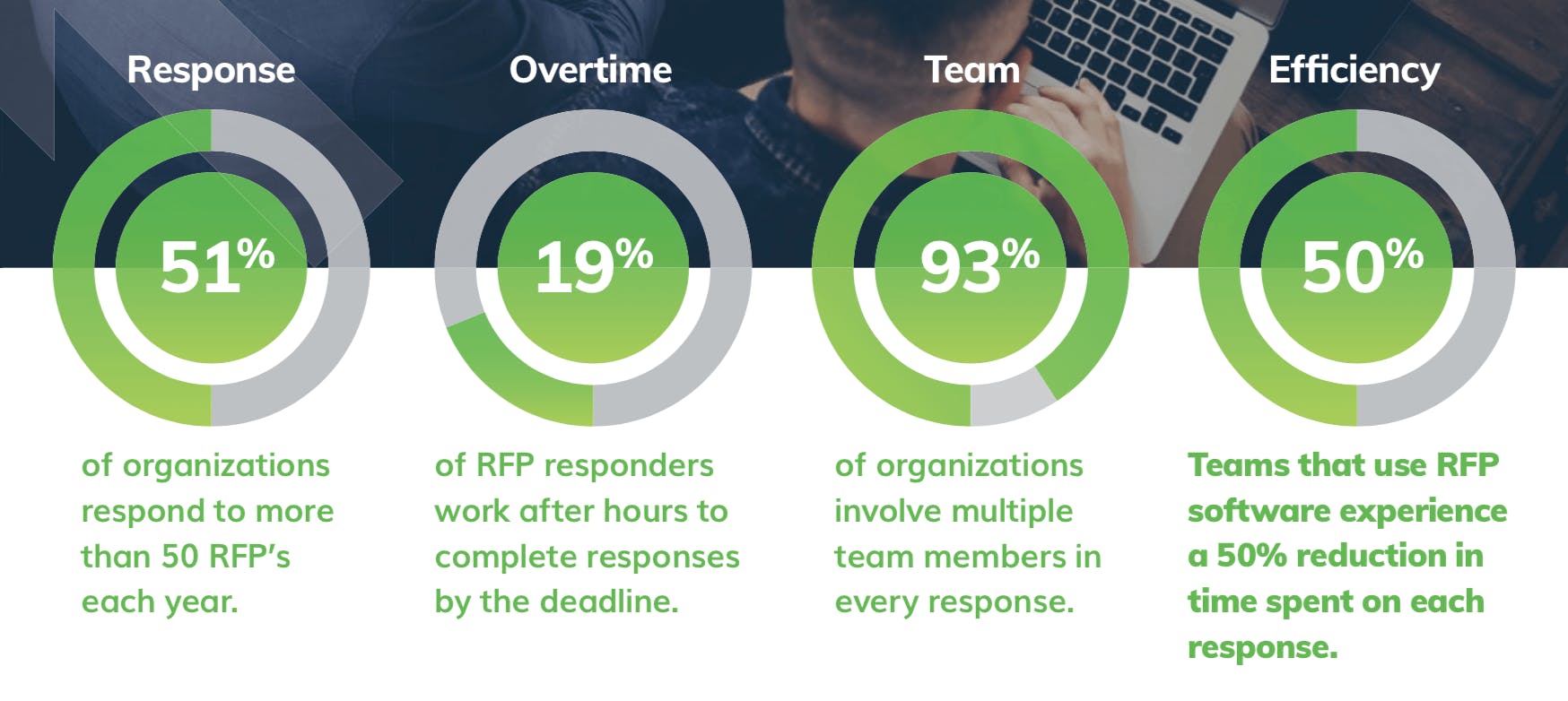Burnout is just one of those icky feelings to experience as a professional. You feel stressed, tired, and irritable—you’re missing that energizing spark to seize the workday. RFP response teams work hard to win business together, and burnout has a natural way of creeping in. It’s a fairly common organizational challenge that hasn’t been discussed much in the proposal management industry…until now.
Eight out of 10 of those surveyed in the APMP Ethics Survey reported some sort of overwork, burnout, or emotional distress. Of the 1,250 APMP members surveyed across 40 countries, 57% were proposal managers. That means organizations are at great risk of diminishing productivity when it comes to RFP responses.
Now that APMP has pulled back the curtain on our industry, we can all see where we have room to improve. This is why burnout happens with RFP response teams, and how your organization can prevent it.
The cause of burnout with RFP response teams
A typical work week for someone responding to RFPs looks quite different than many other professions, as it involves high stakes. The work you do as an RFP responder has a direct impact on your organization’s growth.
Winning and losing business through RFP responses means there is a constant feeling of high highs and low lows. Balancing this emotional rollercoaster is obviously challenging for anyone, whether they are a seasoned RFP responder or new to the role. It’s no surprise that 72% of APMP members revealed that emotional exhaustion was an issue for them.
The proposal management industry is known for its long work hours and demanding schedule, which is precisely why 82% of APMP members said they felt overworked and burnt out. In our own survey at RFPIO, we discovered that 19% of RFP responders worked evenings and weekends to submit RFPs before deadlines. Why is this happening?
Well, another unique thing about professionals who respond to RFPs is this…it’s not their primary job responsibility. Subject matter experts (SMEs) are called away from other priorities to provide their expertise. On a single RFP, it’s common to have people band together from marketing, sales, product, IT, and even human resources.
That doesn’t mean a proposal manager has it any easier with RFP response being their primary job responsibility. Because they have to manage both the people and the process. Many don’t have a defined RFP response process to align their team. And despite advances in technology within the proposal management industry, 84% of organizations work with a manual process instead of RFP software.
Prevent your RFP response team from burning out
Burnout is defined by the three dimensions of exhaustion, cynicism, and inefficacy. You can imagine the impact on your organization when burnout strikes an RFP responder. Productivity diminishes and negativity spreads—until one day you lose this team member altogether when they decide to pursue other career opportunities.
“Burnout is a prolonged response to chronic emotional and interpersonal stressors on the job, and is defined by the three dimensions of exhaustion, cynicism, and inefficacy.” – Annual Review of Psychology
Preventing your RFP response team from burnout means being more aware of work behaviors, but also taking initiatives to improve the workplace. Here are a several ideas to consider to promote a positive work environment and keep your RFP response process humming along.
Notice behavioral cues
It’s very easy to get lost in the everyday chaos and miss important behavioral cues. Are they constantly missing deadlines? Are their RFP responses missing the mark? Are they resistant to contributing to RFPs? If the answer is “yes” to any of these questions, it’s time to sit down with this team member and figure out a solution.
Their actions are signs of burnout. By having an open discussion with this person, you might be able to turn things around. Find out why they are struggling. You might discover it’s a personal issue affecting their work, but likely you will find an internal situation that needs to be addressed.
Pay attention to workloads
The opposite of the person saying “no” is the one who always says “yes” and takes on too much. This happens often with RFP responses. That dependable and knowledgeable SME is called upon for support more than the person who looks the other way when the RFP project assignment lands in their inbox.
You certainly don’t want to exhaust your experts. RFPIO has several dashboards that help you see RFP contributors at a glance so you can reallocate work. These dashboards also shed light on your process so you understand when and where you need to hire additional resources.

Reward team players
For team members who contribute consistently to RFP responses, giving a quick shout-out or small thank you gift at an all-hands meeting will go a long way. All too often this doesn’t happen. A lack of recognition creates less of an incentive for SMEs, who already have plenty to do beyond responding to RFPs.
You can use the previously mentioned dashboards in RFPIO to spot your top contributors and reward them. Positive reinforcement is not only good for the person receiving it. Other team members will feel more inspired to contribute to RFPs if they know their efforts might result in recognition or potential career advancement.
Provide educational resources
Education doesn’t have to stop at training someone to do a job upfront—it should continue so they can do their job well for the long haul. Resources for RFP responders tend to be difficult to hunt down as many times content is focused more on issuers of RFPs.
APMP is one of the best resources, with webinars, guides—and one of our personal favorites—the APMP Body of Knowledge. You can always count on us at RFPIO to deliver educational content as well. Our blog is here to fill that resource gap and elevate you in your role as an RFP responder.

Define your RFP response process
Role conflict is tough for RFP response teams. When roles and responsibilities are not clearly spelled out, RFP responses get deprioritized and ignored. Although organizations have a one-sheet strategy for just about everything, RFP response somehow gets overlooked. This is a little nuts considering how complex this process is for teams.
Defining your workflow keeps the order of operations running smoothly. When an RFP is issued in step one, you know who is handling each task. The same clarity can be applied to the review and submission steps. Here’s an RFP response process example you can easily follow, customize, and implement.
Make collaboration easier
Collaboration is necessary for the success of RFP responses. However, the people on your RFP response team might be on different sides of a building or even different sides of the planet if you have multiple or remote offices. Having an RFP project meeting isn’t realistic, and it’s not a good use of everyone’s time. Uh-oh…here come the emails.
Crowding inboxes with RFP project requests will only cause additional burnout. RFP software like RFPIO integrates with popular communication tools like Slack, and also has chat options within the platform. Less email = happy people.
Save time with technology
You saw this coming a mile away, didn’t you? A manual RFP response process is crazy inefficient, causing team members to work after hours to get the job done. They will rush, and the job won’t be done well. Their heart won’t be in it. This will lead to burnout, and it can harm the business opportunity.
If you’re using spreadsheets and docs to respond to RFPs, this method isn’t properly supporting your team. Searching for historic RFP responses in random folders can be eliminated with a centralized Content Library. That’s just one benefit, and there are many that make life easier for RFP responders so they can be more effective and feel happier about what they do.
It’s clear from APMP’s survey that there is work to be done. There are positive things happening in the proposal management industry, with 88% feeling a strong sense of accomplishment on the job and 87% saying they “believe their companies are ethical”.
The overwhelming evidence of overwork and burnout are certainly an ethics concern we need to address in the bid and proposal industry. Let’s all do our part to notice signs of burnout among our team and take action. We’re in this together.

